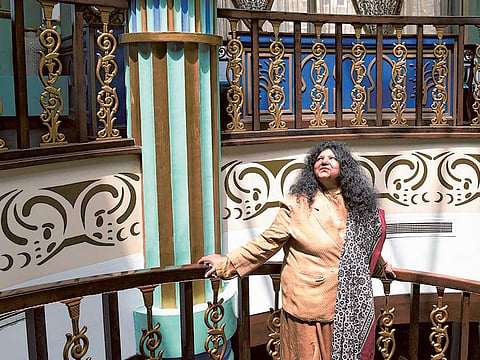Abida Parveen: Music is not poetry but a divine message
Legendary Pakistani Sufi singer talks about the spiritual connection pure music creates ahead of her Dubai show this weekend

Often referred to as the Queen of Sufi music, Abida Parveen is back in Dubai to perform on Friday, September 16, at Jumeirah Emirates Towers. The show, Wahdaniyat, will also feature popular Pakistani singer Mohammad Ali from the band Suroor. However, Parveen clarifies that theirs will be separate performances.
Born to Ghulam Haider, a Sindhi Sufi in Larkana, Pakistan, Parveen began training with her father at the tender age of three. She rose to prominence in the 1990s, performing globally. Some of her best known songs include Yaar Ko Humne Ja Baja Dekha, Mann Kunto Maula and Chaap Tilak, and ghazals such as Shaam-E-Firaaq and Gul Huuyi Jaati Hai.
She’s made several appearances on Pakistani reality show Coke Studio and judged the pan-South Asia contest show Sur Kshetra.
“All music is a blessing or gift from God to mankind. Music is not poetry. It’s a divine message that gives one strength, gives light and a way to life. It connects one to his soul, whether it’s a singer or a listener,” said Parveen. “As a result, the singer, the listener, the atmosphere itself becomes a message of God”.
On the eve of her show the legendary Pakistani singer, who is also the recipient of the Hilal-e-Imitiaz, the country’s second highest civilian award, talked to tabloid! about her upcoming show, Nusrat Fateh Ali Khan and why music needs no words.
‘Music vocalises the greatness of God’
We’ve prepared a couple of new compositions [for this show], although we need to always respect the audience’s requests too. We all know God resides in everything in this world, and it is this oneness with the Almighty which is wahdaniyat. In that sense, every human is His wahdaniyat, nature is wahdaniyat as they have all been created by Him. Yet, at the same time, He is singular and it’s not often that we see people bowing to or vocalising His greatness. We follow our intelligence or our minds more than Him. This is what we want to bring through this show and that’s why we’ve named it Wahdaniyat.
‘Aim of music is to penetrate the soul’
For me it’s important that purity of music should be maintained. When you try and mix two or more genres of music, it creates a different form from the original or the pure form. Sufi kalaam (oration/composition) has its own impact and its own noor [glow] that arises because it’s gift of God. This noor needs to be dispersed in the same manner as one receives it, else it gets diluted when combined with another form of composition. Take for example poet and composer Amir Khusro’s Mann Kunto Maula should be presented in its original form. Actually the aim of music is to penetrate the soul of the listener and that’s only possible if it is pure. And what is music? Music is wahdaniyat and singing is a humble endeavour to achieve that.
Speaking specifically of Sufi singing and music, it’s just not possible to create something new out of it. If you create fusion, it is possible only when really, really well thought out so that when the listener hears it, it doesn’t divert from its purpose or what the narrator wishes to convey.
‘Music needs no words’
Every style of music comes with its own exclusivity and one cannot dilute that purity. But you know narration of music doesn’t need words, just as your desire to be with God doesn’t need to be said in words. This wordless narration between the singer and the listener is what gives rise to a spiritual connection. That’s why it’s important to maintain that purity. Yet in my songs, such as Yaar Ko Hamne Ja Baja Dekha or Jee Chahe To Sheesha Ban Ja or my new album in Farsi Haideriyam Qalandaram Mastam, I’ve conveyed this same purity. In this case because these are such majestic compositions, there’s no need for too many music instruments.
‘Musical legends of Pakistan’
There are very few gharanas (musical families) in Pakistan that are this legendary. Nusrat Fateh Ali Khan was an Ustad [maestro]. He was the crowning glory of Pakistan and I respect him with all my heart and my soul. He took qawwali to the world and with such finesse. The fame he gained is ours as a nation because an artist belongs to everyone.
Sabri Brothers was another big gharana. One of the brothers, Farid Sabri, was a reservoir of musical knowledge and talent. The gharana put in tremendous effort to promote qawwali, including Amjad Sabri [son of Ghulam Sabri, one of the original founders of the gharana, was killed earlier this year]. I was an avid listener of his singing as I felt he had polished his singing so much through intense effort in a short time and accomplished so much. Very few people display such passion and burning desire to learn. Hopefully, we’ll soon see another talented protege from this family.
‘My audience motivates me’
I’ve received so much love and admiration from audience, wherever I go, and this is what motivates me to perform more and better each time. Inshallah, this time too they will not be disappointed.
Don’t miss it
Abida Parveen’s Wahdaniyat, featuring Mohammad Ali, will be held at Godolphin Ballroom, Jumeirah Emirates Towers. Tickets start Dh500, on platinumlist.net
Sign up for the Daily Briefing
Get the latest news and updates straight to your inbox


